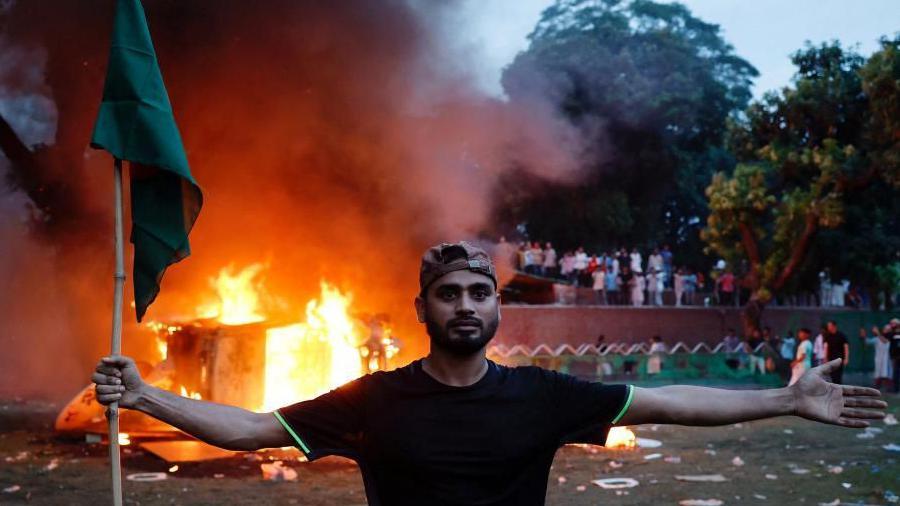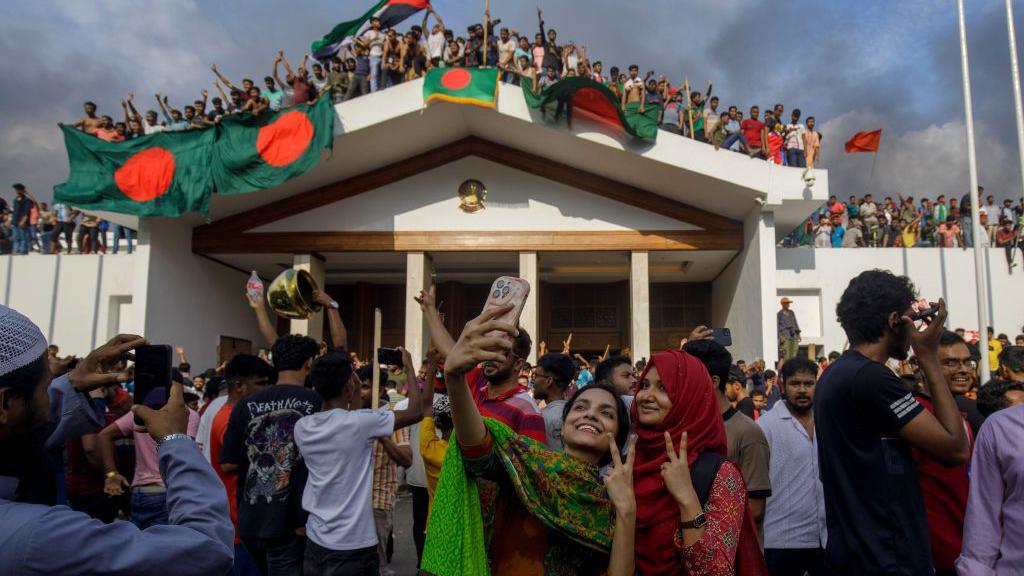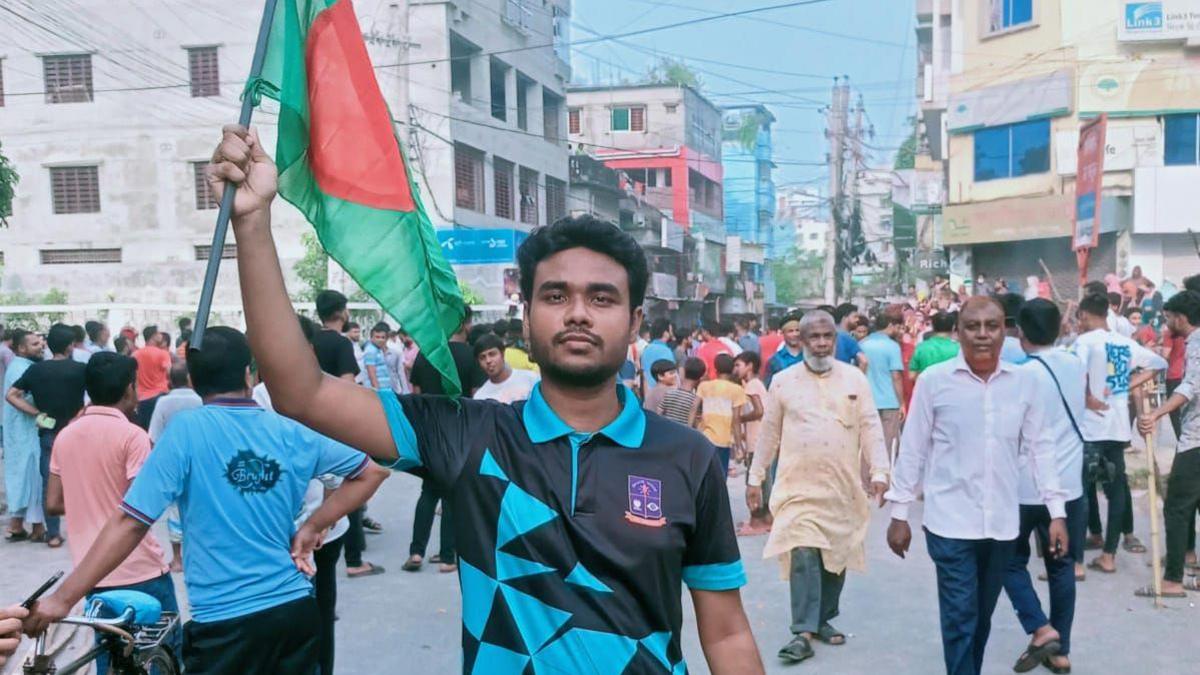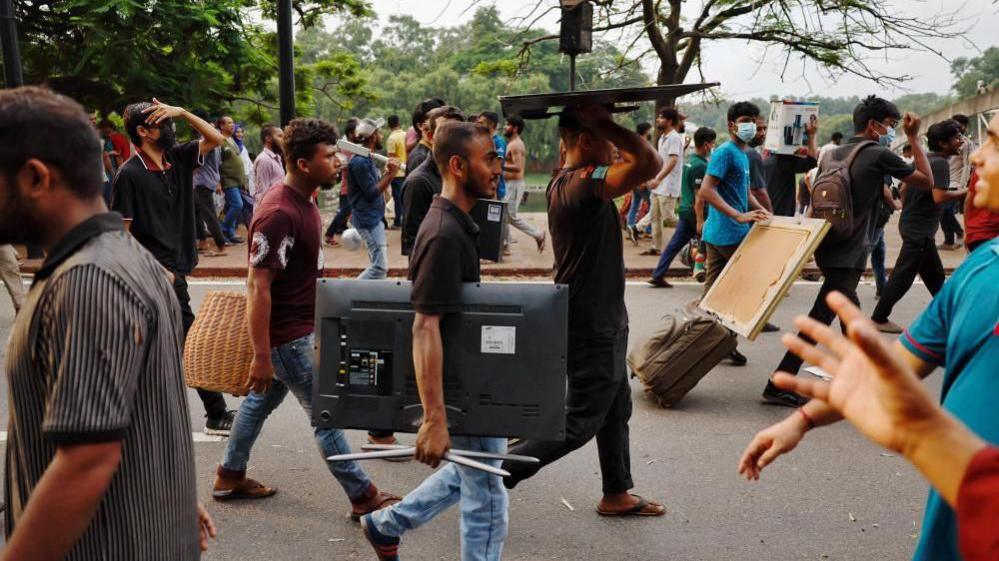'Free again': An uncertain Bangladesh emerges from Sheikh Hasina's grip

Bangladeshis are waiting to see what unfolds following a protest movement that toppled their prime minister
- Published
When Nazmul Arefin caught wind that Sheikh Hasina - the woman who had led Bangladesh with an iron fist for 15 years - was about to flee the country, he dropped everything and ran onto the streets of Dhaka.
Outside, thousands of anti-government protesters were already marching across the capital, although none knew what awaited them.
A weeks-long nationwide campaign of civil disobedience - which erupted over civil service job quotas - had triggered a violent crackdown, leaving hundreds dead in its wake.
And whether more bloodshed would follow remained an open question: “We were sceptical about whether the army would support the people, or side with the government - that was the doubt in the mind of everyone,” Mr Arefin says.
“If law enforcement and the army had turned on us yesterday, it could have become a massacre.”
But the 38-year-old’s fear was quickly replaced with ecstasy, after news spread like wildfire that Ms Hasina had resigned, and citizens began to declare Bangladesh “free again”.
As scenes of protesters storming her official residence and looting everything from velvet chairs to domesticated animals were broadcast around the world, Mr Arefin was witnessing something else.
“It was like a festival on the streets,” he tells the BBC.
“It was amazing - people of all ages and classes came out, from rickshaw pullers to high society people, there were families taking selfies with army officers. We were shouting and celebrating for a new Bangladesh.”
The prime minister’s downfall was one that few saw coming and the shock was palpable.
“The internet had been out for most of the day, so when we heard the army chief was addressing the nation on television, that was our first hint,” Shariful Islam, who was at home with his family when the news broke, told the BBC.
When it became clear what was unfolding, he says everyone "lost it" - his elderly parents and four-year-old daughter included.
“Oh my god, we were all shouting, dancing, clapping, celebrating, it was a taste of freedom, like something you barely experience.”

Bangladesh's army chief says an interim government and new elections will be announced
Ms Hasina, who had been in power since 2009 and ruled the South Asian nation for more than 20 years in total, had started her career as a symbol of democracy, overcoming military rule to usher in a new era of hope.
In the beginning, she was celebrated as a secular Muslim who had brought stability and economic reform to Bangladesh, lifting millions out of poverty in the process.
But when her long tenure finally came to an end on Monday, most were remembering her as an autocrat, who had sought to entrench her authority by silencing dissent.
“This was a dictatorship that lasted 15 years, no-one could speak their minds, people were thrown in jail for expressing their views, there were gross human rights violations, people disappeared. The fact that this is ending - that’s why the streets were full,” Mr Islam says.
How Bangladesh's protests ended Sheikh Hasina's 15-year reign
- Published5 August 2024
What sparked the protests that toppled Bangladesh's PM?
- Published6 August 2024
Hope and trepidation
As Bangladeshis wait to see how the vacuum created in the wake of Ms Hasina’s departure will be filled, hope and trepidation loom large.
“People are happy a dictator has stepped down, but there’s uncertainty [over] what will happen… the law-and-order situation is making people anxious,” Avirup Sarkar - a development professional in Dhaka, tells the BBC.
Sayem Faruk – an entrepreneur who runs an AI firm in the city – says that the first thing that needs to happen is an end to any looting and violence.
“We are going to exercise vigilance in the next few days as the caretaker government is formed and as the army starts taking control of the situation.”
The need for calm and peace on the streets has also been a top-down message from some of the students who started the protest movement back in July and have become its de facto leaders.
“Freedom is harder to defend than to gain,” Asif Mahmud, a leading figure in the demonstrations, wrote in a message to his tens of thousands of social media followers on Tuesday.

Sazid Islam has been taking part in the student-led protests since they began last month
And another student who has been marching for weeks - 22-year-old Sazid Islam - told the BBC that although there’s a feeling that “freedom of speech has been restored” in Bangladesh, many who have been on the frontlines know the situation remains fragile.
“The fears I have now are that, since we have suddenly gained our political rights, if the situation deteriorates, we could face suppression again. Especially if we fail to uphold the values of the revolution.”
Whether everyday Bangladeshis will meet this moment by banding together and not allowing old religious or political divisions to take hold is also a topic of conversation.
“If you can call this a revolution. The issue now is how soon can you manage this?” Sumon Rahman, a journalism professor at the University of Liberal Arts Bangladesh, told the BBC.
“I live quite close to the PM’s residence and I brought my kids there to see what’s happening. There was a lot of vandalism.”
Prof Rahman’s house in the Dhanmondi area is a short walk from the former residence of the nation’s founder, the toppled prime minister’s father Sheikh Mujibur Rahman, which had been turned into a museum. It was set ablaze in Monday’s protests.
“The protesters burned it down totally. I also saw many pictures of the burned house shared on Facebook. The vandalism happened late into the night,” said Prof Rahman.
“There have also been reports of attacks on religious minorities, but it is unclear now if they have been attacked because they are minorities or because they are supporters of [Ms Hasina’s] Awami League.
“If you look at the history of Bangladesh… When there is a revolution, there will be counter-revolutions, coups, counter-coups. If you really want to reform the system, it is a huge duty, and you cannot just instantly remove the machinery as the country will simply fall apart,” he adds.
Samiul Haque, a strategic consultant from Dhaka, says many of his peers are going to want to see a completely new style of politics in Bangladesh, one which is built "from the ground up".
"Young people feel that there should not be a return of the Bangladesh Nationalist Party and Jamaat-e-Islami," the 32-year-old explains, referencing the nation’s opposition parties.
“Inequality had grown so much in Bangladesh as political and economic elites had cosied up to the government. They were reaping so much benefit that what we saw was a class-based movement - students started it, but even rickshaw pullers and normal people joined it. We all felt enough is enough.”

In Dhaka on Monday, and there was looting and disorder in the capital, resulting in the deaths of more than 100 people
For some in the country, though, the most immediate concern is one of safety.
An Indian worker in a Bangladeshi garments factory in Dhaka told the BBC that he was worried his family, who form part of Bangladesh’s minority Hindu community, could be targeted because of Prime Minister Narendra Modi's close alliance with Ms Hasina’s now fallen government.
“I am hearing about some Hindu properties being attacked but I am not sure if it’s true. But my area is peaceful. Many Muslim neighbours have assured us about our safety,” he says.
“I am hoping to get out along with my family as soon as I can. But I do hope to return - my life is here; my career is here. Bangladesh has given me everything.”
But Mr Arefin hopes that the country’s better angels will win out in the next few days and weeks.
“From this point, we are calling it Bangladesh 2.0 and we want to have a diversified and corruption-free country, where everyone can have freedom of speech, and no one will be afraid to raise their voices.”
And Mr Faruk says that he has faith that the demonstrations - which have unified many in the country of 170 million - will stamp out divisions, rather than amplifying them.
“This began as a movement against discrimination and this discrimination applies not only to jobs but everywhere in Bangladesh - attacks on minorities, the fundamentalist forces. We need to control those as well if we don’t want to turn into a failed state.”